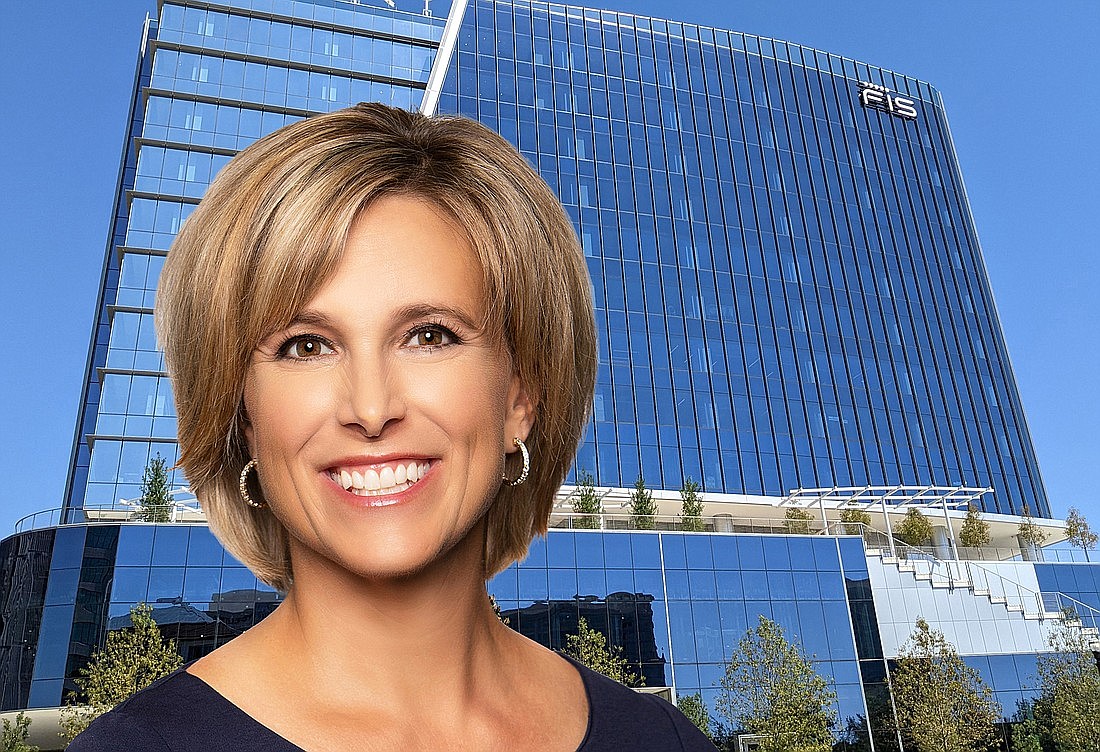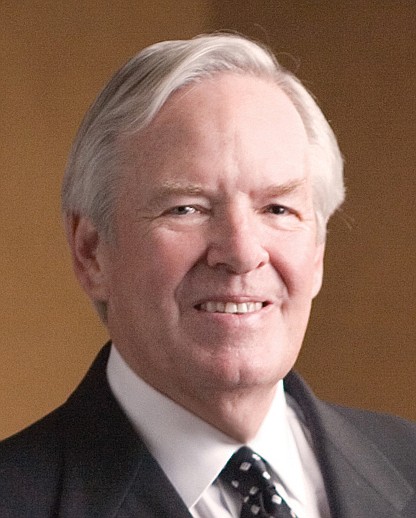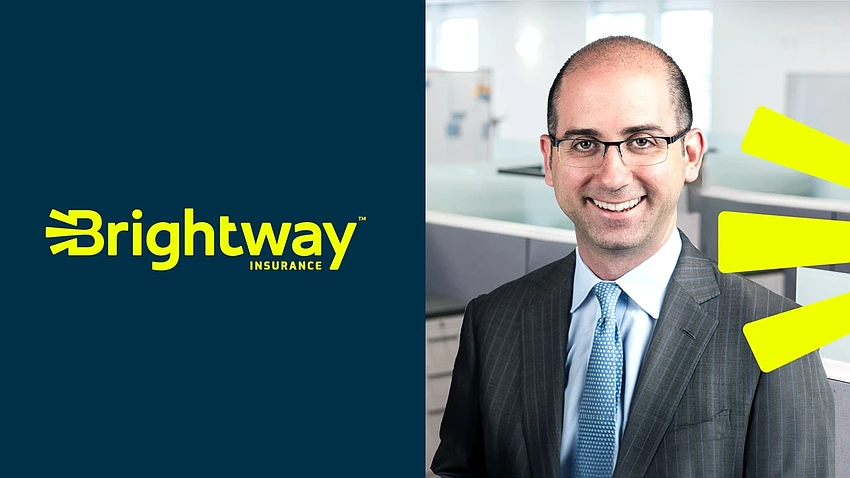
As she begins her second year as CEO of Fidelity National Information Services Inc., or FIS, Stephanie Ferris says she believes the Jacksonville-based financial technology company is back on track.
“When I stepped in as CEO, we were facing an uncertain economy, a banking crisis, inflation and a market where new capital was scarce,” Ferris said in a Feb. 26 conference call with analysts.
“While FIS was a statured company with over 50 years of market success, it had lost its focus in recent years,” she said.
FIS, which was spun off from Fidelity National Financial Inc. in 2006, traces its roots to a company called Systematics Inc. founded in 1968.
Ferris became CEO in December 2022.
“Fast-forward a year later and we are now a much different company with renewed focus, vision and measurable results,” she said.
FIS reported fourth-quarter adjusted earnings from continuing operations of 94 cents a share, 4 cents lower than the fourth quarter of 2022. The company said its earnings were lowered by 7 cents a share related to higher interest costs.
FIS is projecting 2024 revenue of $10.1 billion to $10.15 billion, up from revenue from continuing operations of $9.8 billion last year.
Adjusted earnings are projected at $4.66 to $4.76 a share, up from $3.37 in 2023.
FIS is a smaller company after completing the sale in January of a majority stake in payments technology company Worldpay Inc., which had produced disappointing results since it was acquired by FIS in 2019.
Besides that move improving earnings, FIS is also profiting from its “Future Forward” program, which the company said is on track to produce $1 billion in annual cost savings by the end of this year.
Ferris said in the third quarter of 2023, FIS for the first time in more than two years grew its profit margins on an earnings before interest, taxes, depreciation and amortization basis.
“We are confident that the company is positioned for sustainable margin expansion in 2024 and beyond,” she said.
Fidelity National Financial reported lower earnings for the fourth quarter and all of 2023, as a slower housing market affected demand for its main title insurance business.
Jacksonville-based Fidelity’s fourth-quarter adjusted earnings of 75 cents a share were 26 cents lower than the previous year.
Adjusted pretax earnings in its title insurance business fell 13% to $198 million.

Given the state of the housing market, CEO Mike Nolan is satisfied with the company’s earnings.
“This is an outstanding result, despite the persistent housing market downturn, as home affordability has been cited as the worst in a generation due to continued higher U.S. mortgage rates, which peaked at over 8% in October, combined with limited housing supply,” Nolan said in a Feb. 22 conference call with analysts.
However, the housing market is still impacting title insurance demand in early 2024.
“While we are pleased with our strong performance and profitability, we remain cautious as we have entered the first quarter of 2024 with historic low order volumes, which are expected to pressure industry margins much like last year,” Nolan said.
He said Fidelity is in a good position to benefit from a turn in the market if mortgage rates decline.
“Beyond the near-term pressures, we remain bullish on the mid- to long-term fundamentals of the real estate market. We will continue to develop and invest in technology, recruit top talent and make strategic acquisitions, all while maintaining industry-leading margins,” he said.
During the fourth quarter, Fidelity also had to contend with a cyberattack.
“Given the strong execution of our recovery plan, we were able to resume normal operations quickly in the quarter,” Nolan said.
He said the financial impact was minor, reducing pretax title earnings by $8 million to $10 million.
In response to an analyst’s question, Nolan said Fidelity’s customers did not seem to be concerned about the company’s cybersecurity because of the incident.
“I really don’t see that. I think the impact has been, with customers, negligible,” he said.
“I personally talked to a number of large customers who’ve given no indication that there’s any concerns and I’m not really expecting any impact from long-term customer relationships.”
Fidelity’s adjusted earnings for the full year dropped from $5.38 a share in 2022 to $3.55 in 2023.
Despite the drop in title orders, Fidelity’s revenue for the full year rose 1.6% to $11.75 billion, due to higher interest and investment income and fewer recognized losses on investments than in 2022.
After taking over as CEO of Cannae Holdings Inc., Bill Foley said his mission is to increase the value of its shares.
Cannae is an investment company that was spun off in 2017 from Fidelity National Financial, where Foley remains chairman.

He was named CEO of Cannae on Feb. 12, with former chief executive Richard Massey becoming vice chairman.
“As CEO, I will focus on returns to shareholders, both immediate and longer term. I am very aware of the deep discount that Cannae’s shares trade to net asset value and appreciate the input from our shareholders on the importance of share buybacks,” Foley said in Cannae’s year-end conference call Feb. 21, according to a company transcript.
“As a top five holder of Cannae, I am very aligned with our shareholders in creating value and seeing our share price not only appreciate towards the fair value of our portfolio, but also growing that value,” he said.
Cannae’s most recent proxy statement showed Foley owned 5% of the company’s stock.
Cannae, with investments in a number of businesses, had a net asset value of $33.61 a share as of Feb. 21, Chief Financial Officer Bryan Coy said in the conference call. However, Cannae’s stock closed at $20.08 that day.
Company officials did not say in the conference call why the change in CEOs was made.
Cannae is headquartered in Las Vegas, where Foley moved in 2016 after being awarded a National Hockey League expansion team, the Golden Knights.
Cadre Holdings Inc.’s latest acquisition puts it on a path that looks similar to its predecessor company.
Jacksonville-based Cadre, which makes safety and survivability products for law enforcement and first responder markets, announced an agreement Feb. 20 to buy nuclear safety products company Alpha Safety for $106.5 million.

CEO Warren Kanders said in a conference call the deal is part of a plan to expand Cadre’s reach into other markets.
“This is just one step in a larger strategy where we will seek to acquire companies in new verticals making highly engineered technical products with superior margins, protected market positions and multidimensional growth opportunities,” he said.
Cadre’s predecessor business, Armor Holdings Inc., was also mainly a law enforcement products company.
However, in 2001, it acquired mobile security company O’Gara-Hess & Eisenhardt, which offered products including High-Mobility, Multi-Purposed Wheeled Vehicles, commonly known as Up-Armored Humvees.
When the U.S. invaded Iraq in 2003, the Humvees became a key product for the U.S. military and Armor Holdings’ sales soared.
Armor Holdings generated $2.6 billion in annual sales before it was sold in 2007 to BAE Systems Inc. for $4.5 billion.
Kanders led a group that bought back the law enforcement products business from BAE for $124 million in 2012.
Since then, Cadre has been growing through acquisitions and Kanders has repeatedly stated he’s on the lookout for more merger targets to expand the business.
That does not mean Cadre will grow as big as Armor Holdings, but Chief Financial Officer Blaine Browers said in the conference call the company sees more than 100 potential merger and acquisitions targets.
Kanders said it is likely to expand into other new business categories.
“Along those lines we believe we will be able to announce at least one additional transaction in this calendar year,” he said.
The St. Joe Co. reported higher revenue for 2023 as sales of residential homesites and homes rose in the difficult market.
Panama City Beach-based St. Joe said total revenue rose 54% to $389.2 million and earnings rose by 12 cents a share to $1.33.
The company, which develops properties mainly in the Florida Panhandle, sold 1,704 homesites and homes, up from 1,068 in 2022.
St. Joe also said hospitality revenue rose 57% last year and leasing revenue rose 30%.
“We achieved a Company record for a single year revenue in hospitality and leasing even though 2023 was not a full year of operations for the five new hotels and various new leasing properties completed throughout the year,” CEO Jorge Gonzalez said in a Feb. 21 news release.
St. Joe was a longtime conglomerate headquartered in Jacksonville before selling off its other businesses to focus on real estate development.
The company moved its headquarters to the Panhandle in 2010 to be closer to its real estate holdings.
Brightway Insurance announced Nick Clements has been appointed CEO, effective March 1.

Clements has more than 20 years of experience with fintech businesses, Brightway said. His previous positions include president of credit cards at OneMain Financial and co-founder of investing information site MagnifyMoney, which was acquired by LendingTree in 2017.
Brightway’s announcement did not mention Mark Cantin, Clements’ predecessor as CEO. Cantin’s LinkedIn profile says he remains a board member of Brightway.
Jacksonville-based Brightway is a personal lines insurance distribution platform with more than 350 agencies in 35 states and more than $1.2 billion in annual premiums.